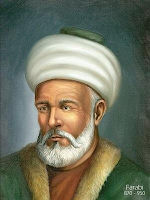While al-Farabi does not have a specific term for ‘philosophy of religion’, he does in fact have one which can more or less literally be translated as ‘philosophy of society’, namely, falsafa madaniyya. Notably, this notion embraces two chief moments. First, in line with Aristotle’s Nicomachean Ethics, it comprises an intrinsically anthropological and ethical element; accordingly, falsafa madaniyya is the part of philosophy dedicated to an inquiry into the kamal al-insan, the perfection of man, as an individual.
Second, just like Plato’s Politeia and Aristotle’s Politica, it moreover deals with the madina, the polis, as a whole, taking into account its makeup and administration. However, it does so strictly from two angles: it assesses the madina and its regime with respect to their success, on the one hand, in guiding citizens towards their individual perfection and, consequently, towards ultimate happiness; and on the other hand, in emulating society’s normative model, namely, the cosmic order, through the makeup of the city.
In line with Aristotle, al-Farabi leaves no doubt whatsoever that there is one kind of happiness which constitutes the telos of every human being. Occasionally, he distinguishes between “earthly” and “ultimate felicity”, however, from the majority of his writings it is clear that happiness in the strict sense of the word, that is, as the concomitant of the highest human perfection, is ultimate felicity.
Yet, in contrast to Aristotle’s notion of eudaimonia, al-Farabi’s ultimate happiness is a state associated with the afterlife, when, according to his theory of the soul, the soul has separated from the body (see the entry on al-Farabi’s psychology).
The achievement of this state is contingent upon a number of preconditions. However, before these preconditions can be broached , further scrutiny of al-Farabi’s concepts of human perfection and the afterlife is required.
Al-Farabi happiness is the attainment of intelligibility. Both of them described their concepts as. the goal of life and both of them excluded any materialistic entities from their concepts.
In his political theory, Al-Farabi stressed that happiness for citizens must be emphasized, and that is the primary goal of the state. According to Al-Farabi, governance in a country is like a complementary body element to one another to create a common goal in the state.
Al-Farabi's school of philosophy "breaks with the philosophy of Plato and Aristotle moves from metaphysics to methodology, a move that anticipates modernity", and "at the level of philosophy, Alfarabi unites theory and practice in the sphere of the political he liberates practice from theory".
Tags:
Education

